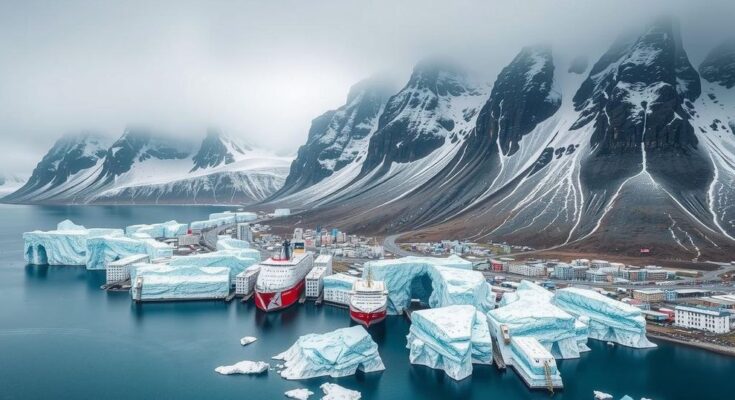Greenland’s melting ice and abundant resources are at the heart of worldwide climate and geopolitical dynamics. The island influences global weather patterns and sea levels, and nations are vying for its precious minerals and hydrocarbons. As the Arctic opens for trade and exploration, Greenland’s strategic importance continues to rise due to climate change implications.
Greenland, the world’s largest island, holds significant influence over global weather patterns and climate change. Positioned strategically in the Arctic, it intersects critical issues such as environmental changes, resource scarcity, and geopolitical tensions. As climate change accelerates, Greenland’s melting ice and abundant resources—including rare earth minerals, oil, and natural gas—are garnering increased interest from nations vying for resources and strategic advantages. Furthermore, its vast ice reserves pose a global sea-level threat, with potential to reshape coastlines dramatically.
Climate scientists emphasize that the melting ice in Greenland is a major factor affecting global sea levels and weather patterns. As the ice melts, it contributes to rising sea levels, which could affect coastal regions worldwide. Notably, Greenland serves as a key player in the Atlantic Meridional Overturning Circulation, a crucial ocean current system influencing climatic conditions across the globe. Any significant alteration in this system may result in drastic weather changes, heightening the urgency for policymakers and nations to monitor and act on Greenland’s evolving dynamics.
Geopolitically, Greenland’s location between the United States, Russia, and Europe elevates its importance, particularly as polar regions become accessible for shipping and trade. The island’s unique landscapes, showcasing ancient geological formations and breathtaking natural beauty, further capture the interest of researchers and environmentalists alike. As nations shift their attention towards the Arctic, the implications of Greenland’s melting ice and the fate of its resources are poised to be at the forefront of the global environmental and geopolitical discourse.
The article discusses the intersection of climate change, resource availability, and geopolitics in relation to Greenland. As global temperatures rise, Greenland’s ice coverage is receding, leading to significant implications for sea levels and weather patterns worldwide. Concurrently, its mineral resources are increasingly sought after by countries aiming to reduce dependency on imports from settings like China. The geopolitical significance and environmental changes illustrate how Greenland stands as a critical focus in contemporary global issues.
In summary, Greenland’s strategic position in the Arctic and its vast natural resources play a crucial role in global dynamics. The accelerated melting of ice in Greenland raises critical concerns over rising sea levels, which could affect coastal regions around the world, while the geopolitical competition for its resources, especially in light of climate change, illustrates the importance of Greenland on the world stage. Thus, monitoring and understanding Greenland’s changes is imperative for both environmental and geopolitical discourse going forward.
Original Source: www.mprnews.org




